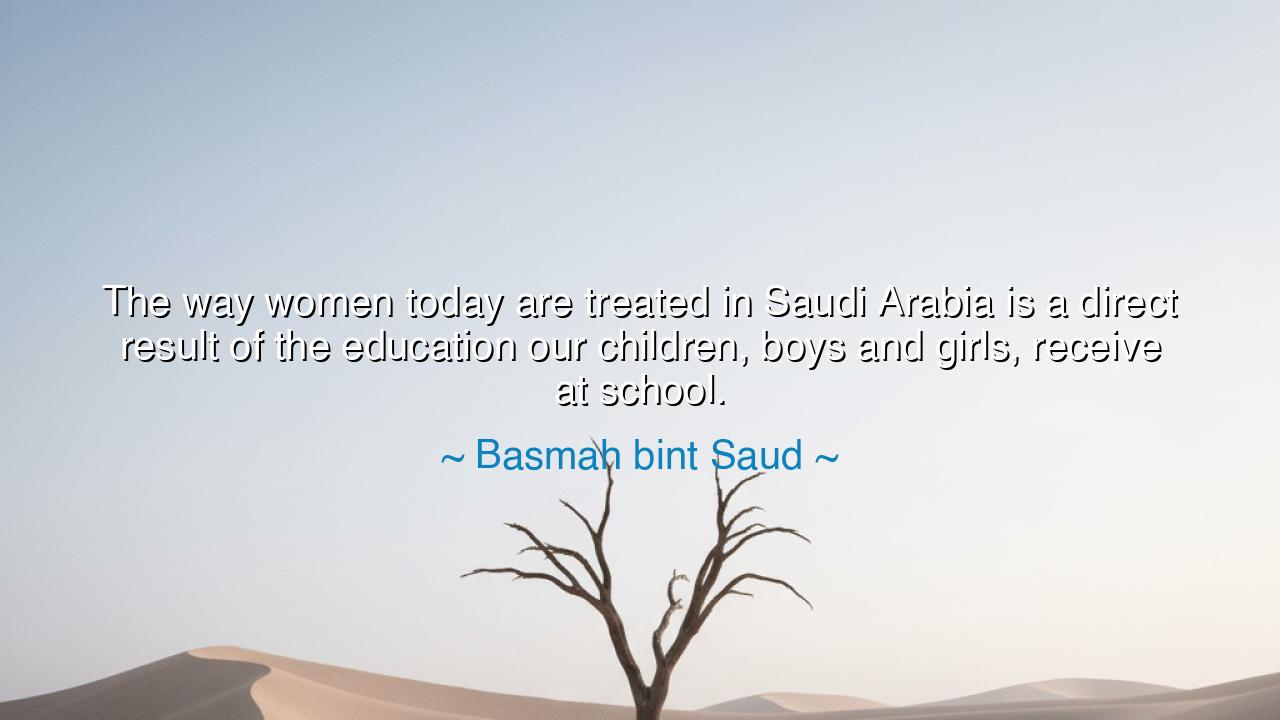
The way women today are treated in Saudi Arabia is a direct
The way women today are treated in Saudi Arabia is a direct result of the education our children, boys and girls, receive at school.






Hear, O seeker of justice, the words of Princess Basmah bint Saud, a voice of courage rising from within the Kingdom: “The way women today are treated in Saudi Arabia is a direct result of the education our children, boys and girls, receive at school.” This saying is no idle reflection, but a call to see the roots of oppression, to understand that how a people are taught in youth will shape how they act in manhood and womanhood. For from the lessons of the classroom flow the laws of the land, the customs of the home, and the destinies of nations.
For education is the seedbed of the future. What children are taught—about power, about gender, about worth—becomes the measure of how they will treat one another when they grow. If boys are raised to believe that women are lesser, they will enforce that belief in law and life. If girls are raised to think their voices must be silent, they will struggle to find the courage to speak. Thus, Basmah’s words are as a mirror, showing that the treatment of women is not random nor natural, but cultivated, rooted in the teachings of youth.
The school is therefore more than a house of letters; it is a forge of values. In Saudi Arabia, for many years, the curriculum separated the roles of men and women sharply, emphasizing submission for women and authority for men. The result was generations shaped by this doctrine, where inequality seemed natural because it was learned early. Basmah, in naming this truth, places the responsibility not only upon governments and rulers, but upon the lessons whispered in classrooms and enforced in textbooks.
History reveals this pattern again and again. In ancient Sparta, boys were taught from youth that they were warriors, bred for battle, while women were given training in strength and freedom to manage homes. This education produced a society where women had more independence than in many other Greek states. In contrast, in Athens, girls were often left uneducated, confined to the house, while boys were trained in philosophy and politics. And so their society, great in learning, remained unequal in practice. The treatment of women followed directly from the education of children.
The same can be seen in the story of Malala Yousafzai of Pakistan. When extremists declared that girls must not go to school, they sought to enforce silence and subordination by cutting off learning. But Malala, even as a child, recognized that education was the key not only to knowledge but to dignity. She defied them, was struck by violence, yet rose again to proclaim that the future of women rests upon what they are taught as children. Her life is a living echo of Basmah’s words.
The meaning of this teaching is clear: if a people would change how women are treated, they must change what children are taught. Laws may shift, rulers may rise and fall, but unless the hearts of the young are shaped by equality, compassion, and justice, old patterns will return. Education is not only the passing of knowledge but the sculpting of culture, and culture determines the fate of all.
Therefore, O listener, take this lesson to heart: examine what is taught to the young. In your home, in your school, in your society, ask—what vision of humanity are we planting? Are we teaching boys to honor, or to dominate? Are we teaching girls to rise, or to bow? The seeds sown in youth will be reaped in the life of the nation. If you desire a society of justice, then let the lessons of equality, respect, and dignity be written upon every page of education.
For as Basmah bint Saud declared, the treatment of women is not fate but formation. And if formation begins in the school, then the power to transform lies in the hands of teachers, parents, and communities. Shape the child, and you shape the future. Teach rightly, and generations yet unborn will walk in freedom.






AAdministratorAdministrator
Welcome, honored guests. Please leave a comment, we will respond soon